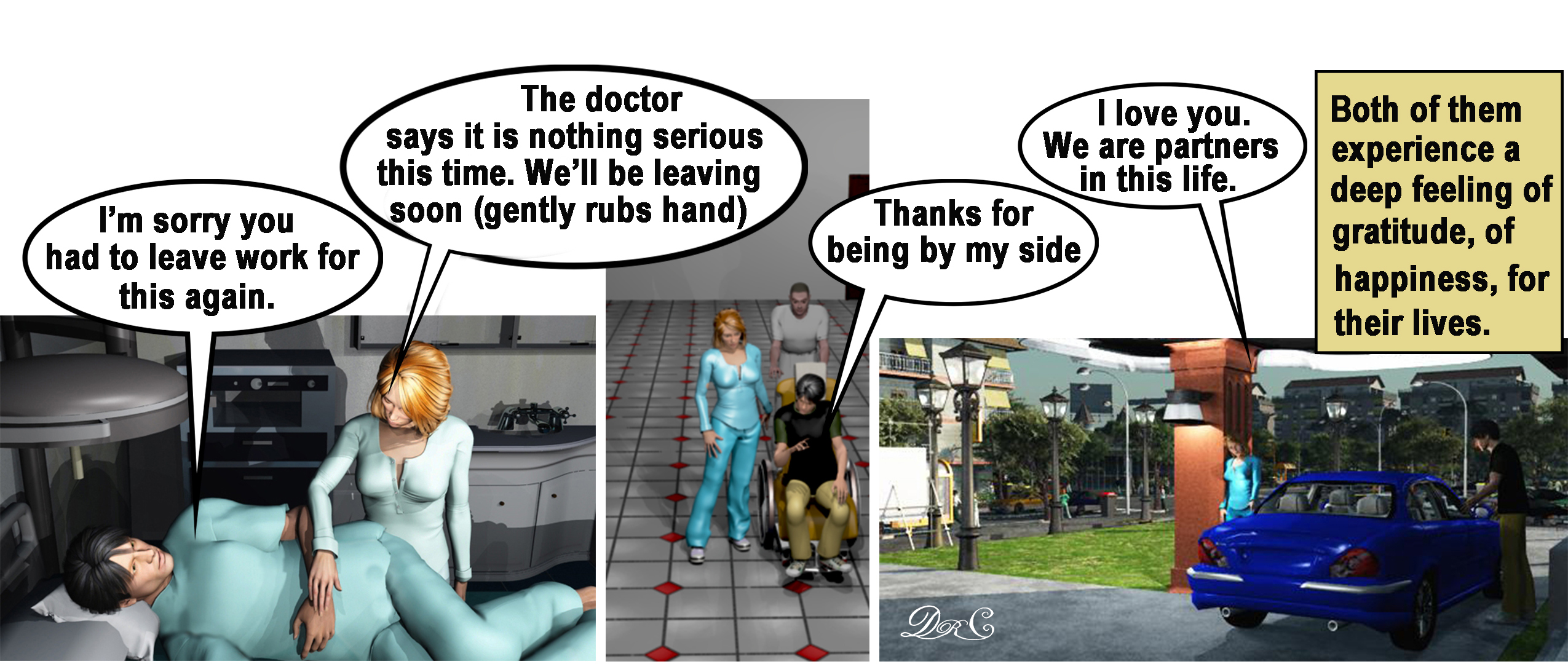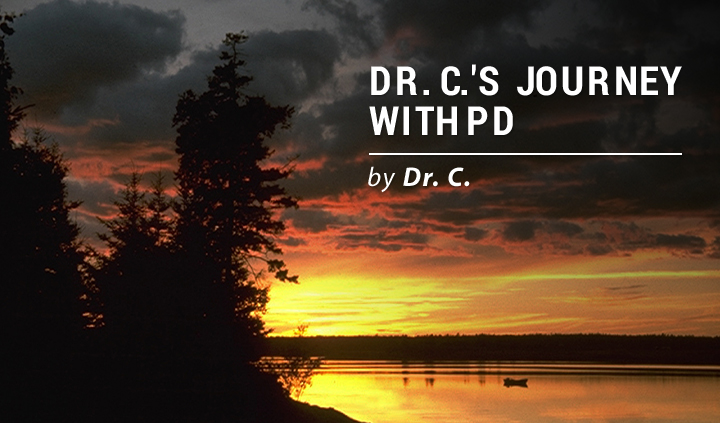Holding On to Happiness, but Not Too Tightly

(Graphic by Dr. C)
Life, liberty, and the pursuit of happiness. The H in the CHRONDI Creed refers to happiness. Happiness can be an elusive thing when battling a chronic disease like Parkinson’s. So many things can get in the way of experiencing happiness: pain, deep fatigue, irritability, the time consumed by the disease, and grief accompanying things stolen by the disease. Trying to hold on to even small moments of happiness is challenging. However, it is possible to experience moments of happiness in the face of chronic disease if one trains the brain to hold the moment gently — not too tightly.
Happiness is a state of mind and includes a broad range of phenomena, such as gratitude, inspiration, accomplishment, beauty, awe, laughter, compassion, tranquility, joy, love, exhilaration, ecstasy, and bliss. The experience of happiness can have a connection to one (or several) of these phenomena. Before you finish reading this column, let’s take a mental excursion together.
Visualize in your mind the last time you were happy and try to feel how you felt at that time. Try to hold the moment gently. Pause now to do that before reading on.
Want to learn more about the latest research in Parkinson’s Disease? Ask your questions in our research forum.
Were any of the above phenomena part of your memory? Remembering happiness is helpful in reminding us what it felt like and of what the experience may look like again. It can help us to see it in the smallest of moments throughout our lives. It is not a practice of grasping after happiness. Happiness is like a butterfly flitting from flower to flower. We take in the beauty and the rich, sensual experience and hold it gently in our mind. If we were to grasp the butterfly, we would destroy the experience.
Gently holding happiness without grasping is tied to a compassionate way of being. So much of our unhappiness is tied to grasping, to misperceptions, objectification, and poor communication in relationships. The practice of compassion is about experiencing the needs of others and then moving beyond suffering to a place of well-being. It is a shift in perception and out of suffering. Walking the path of the compassionate warrior is filled with happiness experiences accompanied by the knowledge of empathy, shifting perceptions, and shared well-being. Scrooge in Charles Dickens’ “A Christmas Carol” wasn’t happy until he experienced a shift in perception and became compassionate.
I don’t expect to experience happiness all the time. That’s just too unrealistic for where I am in my personal development as a compassionate warrior battling a chronic disease. I seek small moments each day, not by grasping for them but by looking for them, like looking at the butterfly, and then gently holding the moment in my mind. Then, I am very grateful for that moment and not sad when it naturally fades into the next experience as part of the day. This feeling of happiness is not induced by drugs or alcohol (which bring fake happiness and negative consequences). It is a happiness that comes from the practice of allowing the mind to experience both the large and small moments of happiness. I do my best to begin and end each day with a confirmation (a mantra or a prayer) of specific gratitude — not a statement of general gratitude but one aimed at something specific in my life. Gratitude is a way of holding the door open for those happiness moments.
Perhaps happiness brain training can be very helpful for those suffering from PD because of the link to dopamine production. I haven’t seen any research on this, but I find the practice to be quite helpful. What do you think? Are there methods you use to bring happiness into your life? Share them in the comments. Let’s pool together a collection of happiness tools for our readers.
***
Note: Parkinson’s News Today is strictly a news and information website about the disease. It does not provide medical advice, diagnosis or treatment. This content is not intended to be a substitute for professional medical advice, diagnosis, or treatment. Always seek the advice of your physician or another qualified health provider with any questions you may have regarding a medical condition. Never disregard professional medical advice or delay in seeking it because of something you have read on this website. The opinions expressed in this column are not those of Parkinson’s News Today or its parent company, Bionews Services, and are intended to spark discussion about issues pertaining to Parkinson’s disease.








don dinwoodie
Playing with our animals,Talking with our grandchildren.Tending our property.Holding hands with my wife.Playing board games.Visiting with friends all bring happiness with them.
Dr. C
Fantastic! Thanks for your post. I hope more readers follow suit.
Darrell Lahan
I have been epileptic since 1992 in the Royal Navy & had a brain tumour removed. I now think I may be developing Parkinson's from my mum. I shake a lot & have lost my sense of smell. Some help & info would be great.
Dr. C
I am not qualified to give specific therapeutic advice here in this format. May I suggest speaking to qualified people in your region. Wishing well-being for you on your journey.
Derek
Happiness, I think, has to be won by work, not necessarily hard work, but it probably will not find you if you are not doing something to earn it. As Dr. C says, compassion is a forerunner of happiness. To love another (unrequited...) is certainly a path to happiness, if not happiness itself.
Robyn
Admiring the beauty in nature, talking to my children and grand children, spending time with friends, ticking things off the to do list, spending time in the garden or at the beach, having a picnic. There is so much in life to be happy about! And, yes, I do have PD.
Fanny
Happiness is enjoying the simple things in life. Chatting with friends, playing with a dog (I love animals), gardening, sitting in the sun, listening to song birds, and spending time with my husband and family.
Fanny
Happiness is enjoying the simple things in life. Chatting with friends, playing with a dog (I love animals), gardening, sitting in the sun, listening to song birds, and spending time with my husband and family. I have PD.
D
it i known that Parkinson is caused due to low production of dopamine, which acts as a neurotransmitter in this case. however since dopamine is also a hormone, does having parkinson mean dysfunction of dopamine as a hormone as well? do patients of Parkinson tend to lose the sense of being happy?
michael wall
Your column has brought me a great deal of happiness by being so insightful about the existential issues Parkinson's has brought to my life. It's been pretty wonderful when my dad mentions something he has read in your column and how it has broadened his understanding of a particular element I have been grappling with. I feel happy when I get the sense of being understood more fully. My parents just excitedly showed me the new book that arrived today - your book! Thank you for your insights.
Dr. C.
Happy Holidays ! We are so pleased to hear when people benefit from our columns and books. It sure helps on "bad" days to perk us up and keep going. Thanks to your folks for buying the book ~ #2 "Possibilities with Parkinson's: Developing a Self Management Tookkit" is at the publisher's and we hope to announce its availability January or February. Thanks for following the column and your comments.
Dr. C.